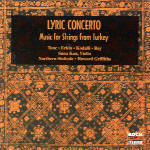Ulvi Cemal Erkin’s (1906-72) Sinfonietta for Strings is an instantly fetching piece. The opening movement’s dotted march establishes a tone not too remote from the world of Bartók’s Divertimento, and like that work, Erkin’s soon diverges off the path into unsettling tonal and rhythmic territory. But here’s where the two part company, for Erkin is less studied than Bartók: he allows his folk melodies to remain closer to the countryside than to the conservatory. Like Erkin, Cemal Resid Rey (1904-85) studied in Paris, and in his case the European influence is more prominent. The Allegro movement of his beautiful Andante and Allegro for violin and strings curiously has the character and style of French salon music, though violinist Suna Kan manages to inject a little Turkish spice into the perfume.
Nevit Kodalli (1924) studied with Nadia Boulanger, among others (it seems Paris was the hot spot for Turkish composers). His Adagio for strings, like many works with this title, is a somber, at times passionate, and very moving piece that employs dissonance to a greater degree than the previously mentioned compositions. And if dissonance is a prominent feature of Kodalli’s Adagio, it certainly rules the roost in the Lyric Concerto for Flute, Oboe, and Strings by Cengiz Tanç (1933). It’s ironic that the disc’s title work should not be for strings alone, and is the least lyrical of the four. I have never been able to warm to the sound of atonal woodwinds squawking about, and this piece sounds to me like a confrontation between a duck and a sparrow. It should come as no surprise that Tanç is the only one of this group who did not go to Paris, but instead studied with the likes of Vincent Persichetti and Milton Babbitt. Well, there you are. In any event, Howard Griffiths and the Northern Sinfonia play all this music in a manner that makes you want to keep listening. Koch furnishes clear sound with natural perspectives.
































